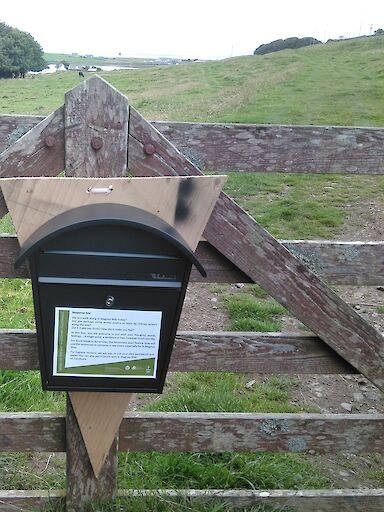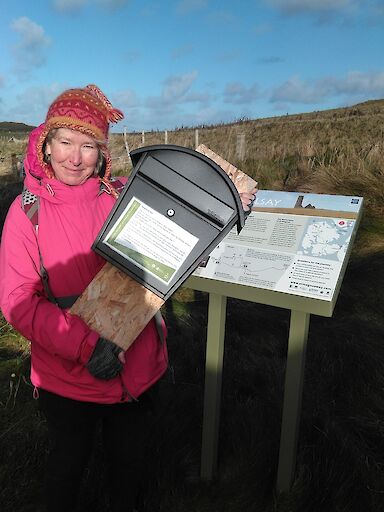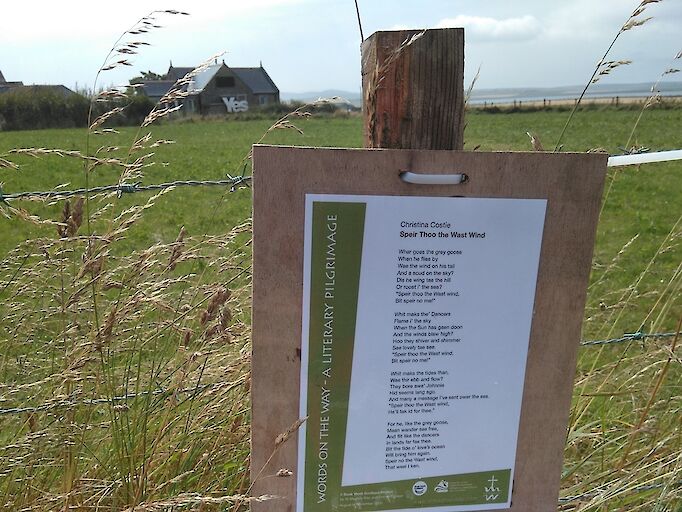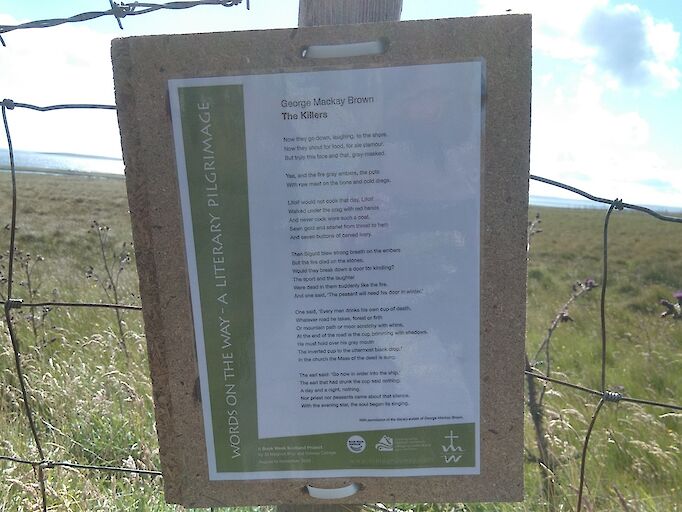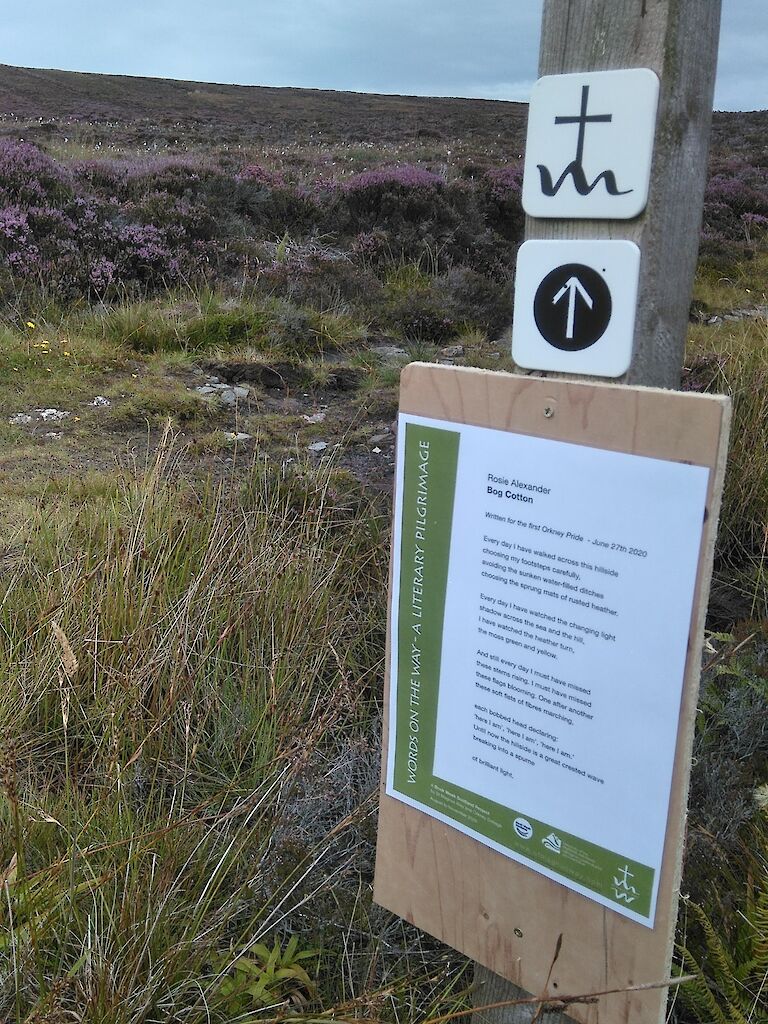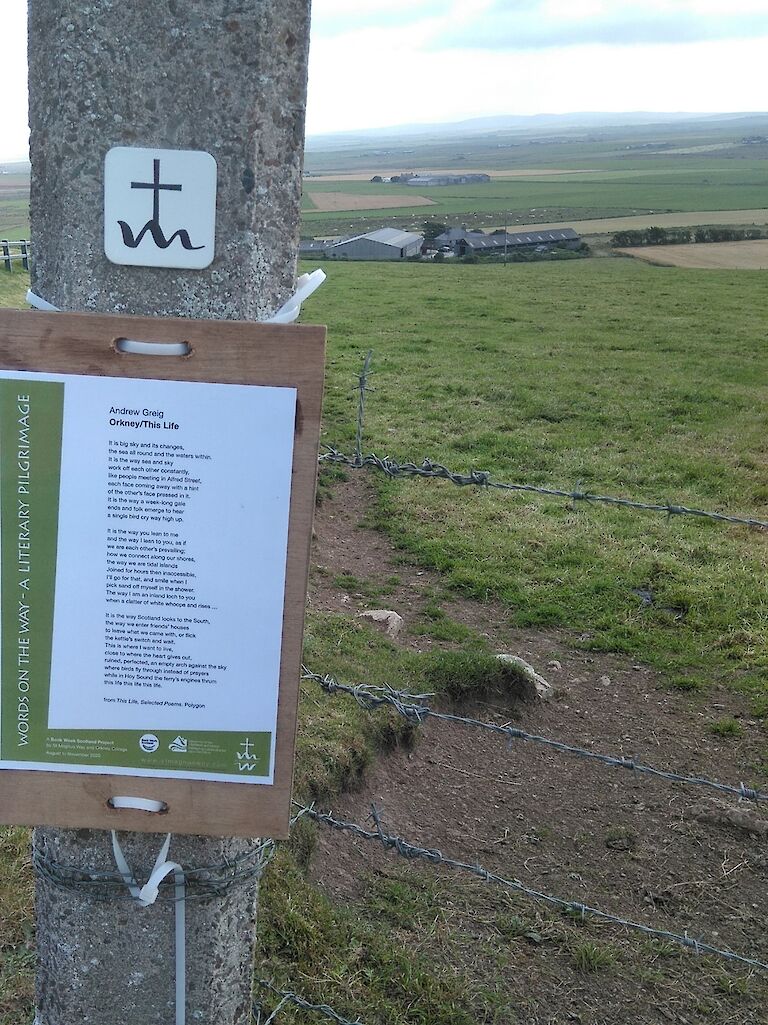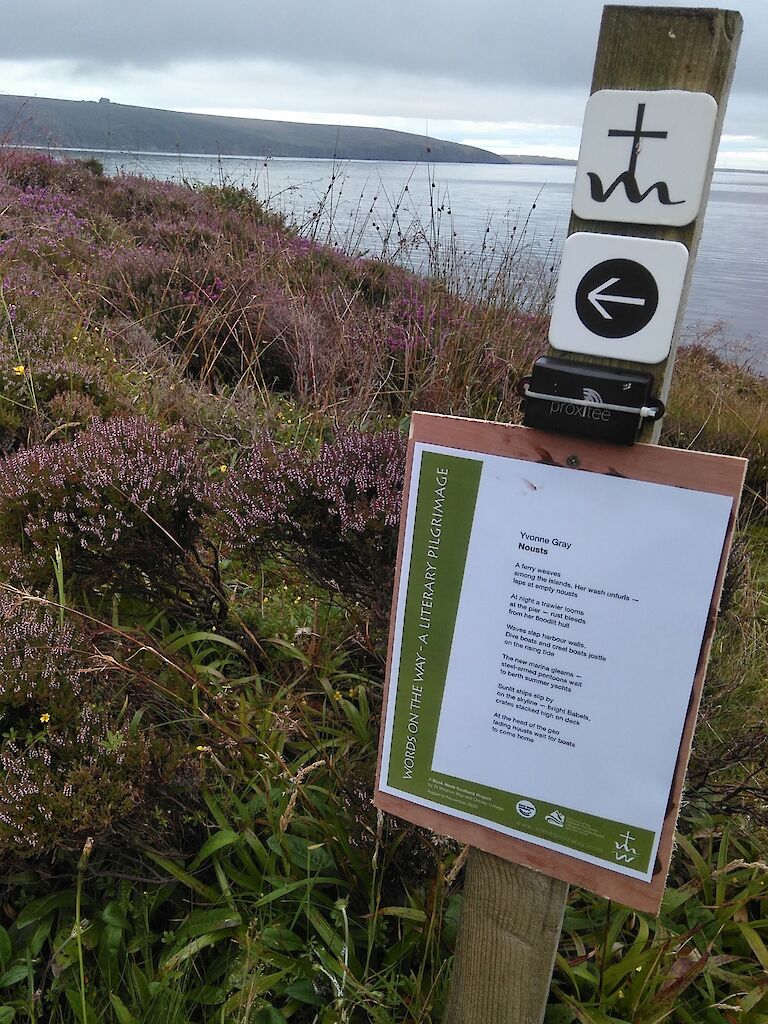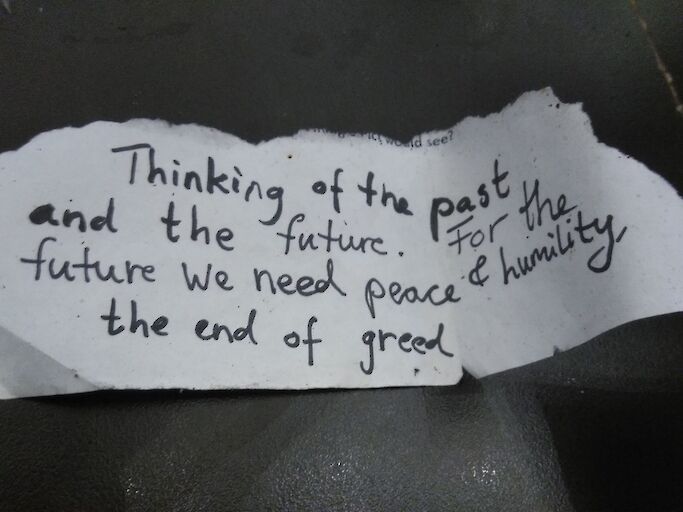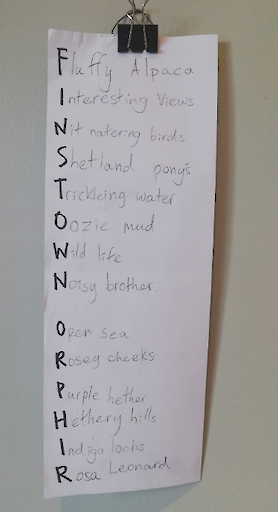Words on the Way: A Literary Pilgrimage is a collaborative project between Orkney College and St Magnus Way, funded by the Scottish Book Trust, which ran from July to November 2020 as part of Book Week Scotland.
The project was conceived as a socially distanced way of creating community engagement with Orkney literature. 20 texts by 13 Orkney writers were put up along the 55-mile-long pilgrimage route from Egilsay and across the West Mainland of Orkney via Evie, Birsay, Harray, Firth, Orphir, St Ola and ending in Kirkwall. The texts were chosen to relate to a specific place or landscape, or the themes of the different legs of the pilgrimage: Peace, Loss, Change, Growth, Forgiveness, and Hospitality.
The texts were chosen to relate to a specific place or landscape, or the themes of the different legs of the pilgrimage: Peace, Loss, Change, Growth, Forgiveness, and Hospitality.
Along the way were also six post boxes, where members of the public could leave their responses to the texts and the experience of walking the pilgrimage route. At the end of the project, for Book Week in November, the boxes were collected, and poet Yvonne Gray crafted a new special St Magnus Way poem building on the responses and her own experience as a pilgrim.
“We began in July, speaking with landowners and authors. All were very positive and happy to be included in this project. It has been met with enthusiasm all along,” says Ragnhild Ljosland from Orkney College, who co-ordinated the project. “Stuart Little from St Magnus Way and I sat down one day and decided on which texts we wanted to include and where they should go. What the texts all have in common is that they are deeply rooted in Orkney, either linked to a specific place, a part of its history, or the way of life here.”
The writers were mostly contemporary authors who are active today, but some historical authors were also included. Furthest back in time lies Rognvald Kali Kolsson, 12th-century Earl of Orkney, nephew of St Magnus and also himself a saint. Rognvald brought about what has been called Orkney’s 12th-century literary renaissance, where he and other poets he employed drew on the rich traditions of Viking Age oral literature and updated it with European continental influences in a poetic fusion cuisine. On the pilgrimage route, Rognvald was represented with a poem in the sometimes muddy Binscarth Woods: it begins, “Five weeks we’ve waded through wetness and filth”. This humorous poem was written in Rognvald’s youth on a trip through Grimsby but perhaps captures the mood as you near the end of leg four of St Magnus Way on a wet autumn day.
Other historical authors, from the 20th century, were George Mackay Brown, Robert Rendall, Eric Linklater and Christina Costie, all much loved by the Orkney community. Their heirs all very generously let us display their texts. Eric Linklater lived in what is now Merkister Hotel, so this was a nice place to hang two excerpts from his novels The Wind on the Moon and The Dark of Summer. It is a lovely place for pilgrims to stop for tea and cakes. Sadly, his daughter Kristin Linklater, who has been a driving force in Orkney’s cultural scene this last decade, died shortly before the Words on the Way project began. Kristin was the original inspiration for the main character in The Wind on the Moon whose heroine is the inventive and resourceful Dorinda who rescues her dad from captivity during a war.
What the texts all have in common is that they are deeply rooted in Orkney, either linked to a specific place, a part of its history, or the way of life here.
Robert Rendall and Christina Costie were friends and neighbours in Kirkwall in the mid-20th Century. They both wrote poetry that was deeply rooted in Orkney’s traditional way of life and used Orkney dialect as their medium. Though they both had a great sense of humour, they also wrote on deeper philosophical topics. Robert Rendall particularly loved Birsay and was represented with three poems about specific places he knew well. Christina Costie was also represented with three poems. One of them, Speir Thoo the Wast Wind, reflects on the destination of drowned men’s souls. Orkney, being an island community, has lost many to the waves, and the poem wonders if they are now free among the wind, the sea, the northern lights and the grey geese that fly across the sky. This poem was put at Moan in Harray, where many grey geese could be seen on their autumn flight and in the fields.
The best-known author in this project is George Mackay Brown, from Stromness. He was deeply moved by the story of St Magnus and as an adult converted to Roman Catholicism. In his poem The Killers he imagines Earl Hakon’s men during the moments and hours following the killing of St Magnus, and how what should have been a celebration of victory with food, drink and merriment feels hollow and subdued.
A contemporary poet who has had a central role in this project is Pamela Beasant. She contributed three poems, one at and about the Norse settlement in Birsay, and two at Naversdale in Orphir: Out of Time and Land/Mind. Pamela has been a very active Orkney poet for many years and was one of the writers who in the 1990s did a project on poetry in place, installing concrete texts specifically made for their location, including the Earl’s Garden. This poetry-in-place project was among the inspirations for Words on the Way. Pamela’s partner Iain Ashman made the poster design for Words on the Way.
On the themes of Forgiveness and Growth, we had chosen poems by the exciting contemporary writers Luke Sutherland and Rosie Alexander. Rosie’s poem Bog Cotton was brand new and written for the 2020 Orkney Pride festival. It was put up near Rosie’s home in Orphir, where bog cotton grows thick on the RSPB nature reserve. During a walk here, Rosie noticed how the bog cotton resembled many small flags. In her poem, the bog cotton bravely dares put its flags up, many of them, all saying, with pride: here we are! Meanwhile, Luke Sutherland’s novel Venus as a Boy is perhaps not what you would call traditional Orkney writing. With its depictions of bullying, transgender themes and drug abuse, and mixing of realism with magical or fantastic elements, some have regarded the work as controversial. Yet it undeniably speaks powerfully to the theme of forgiveness: “When you have lived there and come away, you never quite stop pining for the beauty and magic. Regardless of the nastiness and violence and hate and how shittily people have treated you, you can always imagine going back. What can I say? When I was a kid, I kind of took it for granted, but now I see how it’s almost everything I am. Islands everywhere. ... A map of Orkney’s a map of my emotions, pretty much. A map of me.”
This healing power of Orkney and its nature are also strong themes in Amy Liptrot’s The Outrun and Victoria Whitworth’s Swimming with Seals. These memoirs, both written in poetic prose, came out in close succession in 2016 and 2017, both to accolades and praise from critics. Victoria Whitworth lived for many years by Aikerness Beach in Evie, where she swam at all times of the year. Coldwater swimming for her became a welcome relief from the demands and pressures of life. In the book, and the excerpt we put at Aikerness, Victoria shares with us the immense depth of layer upon layer of archaeology, history, and folklore all within eyesight of this beach, such as the story of the magical fairy island of Hildaland which was tamed and fixed in place as Eynhallow in the Rousay Sound. Amy Liptrot grew up in Orkney, before moving to London as a young adult. The Outrun is a very honest memoir of how returning to Orkney and taking up a job as a “corncrake listener” with the RSPB helped her overcome alcohol addiction. Both books show how the wild can restore life and renew hope.
Andrew Greig and John Aberdein both capture the essence of Orkney in their poems Orkney Movement and Orkney/This Life. On the theme of hospitality, John Aberdein’s poem, hanging by Scapa whisky distillery, humorously claims that the cows here milk fudge and whisky, while “the ebb slips an oyster down the Atlantic throat”. Andrew Greig’s poem, Orkney/This life is beautiful with deep and warmly understated love, well suited for example for a wedding anniversary celebration, but also as a general reflection on what togetherness and community mean. “It is the way you lean to me/and the way I lean to you, as if/we are each other’s prevailing;/how we connect along our shores,/the way we are tidal islands/Joined for hours then inaccessible,/I’ll go for that, and smile when I/pick sand off myself in the shower".
Lastly, the project poet herself, Yvonne Gray, contributed the poem Nousts. This is the old word describing a hollow where boats are pulled up for the winter. Just such nousts can be seen at Hestigeo, St Ola, on the final leg of St Magnus Way.
Yvonne was chosen as the project poet for Words on the Way because of her outstanding poetic skills, her vast knowledge of Orkney literature, and her experience with collaborative forms of poetry. She is a published poet and retired teacher of English, with an M.Litt degree in Highlands and Islands Literature. For her Master’s dissertation, Yvonne researched Orkney poetry and place, focusing on place-specific poems by Pamela Beasant, Morag MacInnes and Alistair Peebles. In recent years, she has taken a particular interest in collaborative writing and led community sessions in the Japanese form, Renga where a poem is written collectively by a group. All of this made Yvonne Gray the perfect candidate as a project poet for Words on the Way.
Yvonne’s commission was to take the notes of response left in the postboxes along the route by members of the public and turn them into a special St Magnus Way poem for Book Week 2020. In preparation, she took it upon herself to walk the entire 55-mile pilgrimage route, a first for her, in all weathers during October. Finally, on 3rd November, the day of the pivotal US presidential election, Yvonne and Ragnhild with her family travelled together to Egilsay to collect the final response box and complete Yvonne’s journey.
“It was an exciting day. We sat down and opened all the boxes one by one. It was like hauling creels: is there a catch in this one? I was a bit nervous that we wouldn’t find anything, but luckily we did,” says Ragnhild Ljosland.
It was like hauling creels: is there a catch in this one?
“Some people had written down things that immediately came to mind, on whatever scraps of paper they had in their pockets. One had written on a piece of a TV licencing bill. Others had taken great care and prepared their response at home, before returning to the post box with their text neatly written and secured in an envelope or sealed plastic bag.”
“The youngest was Rosa Leonard, 9 years old, who had written a beautiful acrostic poem, using the names Finstown and Orphir and describing all the things she saw and experienced on her walk.”
Yvonne took in not only what was written on the notes, but also the look of the notes themselves, what paper they were written on and so on, and the location of the box they were in, using it all as inspiration for her poem.
The result was the brand-new poem, Words on the St Magnus Way which was premiered on Radio Orkney on 18th of November 2020, during Book Week.
Read the full poem here.
Published on November 20th 2020
